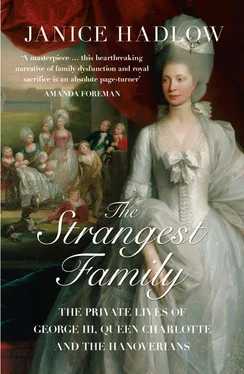Waldegrave thought that George might work harder if he enjoyed himself more. Unlike any of his previous instructors, he was convinced that beneath the habitual indolence, the prince had potential. The present glaring shortcomings in his character were, Waldegrave believed, less a reflection of his true nature and more the inevitable product of the circumscribed life he led: ‘I found HRH uncommonly full of princely prejudices, contracted in the nursery and improved by the society of bedchamber women and pages of the back-stairs.’ 73Wider experience of the world might cure many of the faults that others had found so intractable.
As time went on, however, it became clear to Waldegrave that the kind of change he advocated – a relaxation of the regime of seclusion, a more active participation in society – would never be countenanced by Augusta. For all her anxieties about her eldest son’s education, she would not sacrifice any of her own prejudices to see it improved. She did not expect her authority to be challenged by her son’s governor. She explained to Dodington that she considered the post – and Waldegrave, while he occupied it – ‘as a sort of pageant, a man of quality for show, etc.’. 74Faced with her blank resistance, Waldegrave’s new measures ran slowly but steadily into the ground. Although he was supported in his endeavours by ‘men of sense, men of learning and worthy good men’, Waldegrave eventually concluded he could do nothing to make a real difference: ‘The mother and the nursery always prevailed.’ 75
By the mid-1750s, George’s formal education had done little more than confirm in the self-conscious boy an even greater sense of his own shortcomings. Morbidly aware of his faults, especially those of ‘lethargy’ and ‘indolence’ with which he was so often charged, he seemed incapable of rousing himself to do anything about them. He had, thought Waldegrave, ‘a kind of unhappiness in his temper, which if it be not conquered before it has taken too deep a root, will be a source of frequent anxiety’. The prince’s apparent preference for solitude concerned Waldegrave, especially as he suspected the boy chose to be alone the better to contemplate his misery: ‘he becomes sullen and silent and retires to his closet, not to compose his mind by study, or contemplation, but merely to indulge the melancholy enjoyment of his own ill humour’. 76He had no friends except his brother Edward, to whom he was very close. To everyone else, he revealed nothing of himself. The retired life he and his mother shared had certainly not forged a strong emotional bond between them. When Dodington asked her ‘what she took the real disposition of the prince to be’, Augusta replied that Dodington ‘knew him almost as well as she did’. 77
As he drifted irrevocably towards a destiny that terrified him, George retreated further and further into a private world of remote introspection. Transfixed with apprehension by the prospect before him, lethargy overwhelmed him. Neither his tutors nor his family knew what to do about it, or understood that his much-criticised indolence was less a sign of laziness than a strategy to avoid engaging with a future he knew he could not avoid. By the time he was sixteen, in 1754, he had erected around himself a tough carapace of emotional detachment which no one could penetrate. But George’s life was about to be transformed by someone who would instil in him a new vision of who he was; and, for the first time, offer the anxious boy an inspirational idea of what he might become. He encountered the man who would change his life for ever.
*
John Stuart, 3rd Earl of Bute, was a well-connected aristocrat related to some the grandest names in Scottish politics, including the powerful Dukes of Argyll. For a man whose career was so dominated by the fact of his Scottishness, he spent a surprising amount of his early life in England. He was educated at Eton alongside Horace Walpole, who was later to paint such a malign picture of him in his Memoirs of the Reign of King George III . Bute married early, and for love: in 1736, at the age of twenty-three, he eloped with the only daughter of Lady Mary Wortley Montagu. The girl’s furious father refused to make any financial provision for his disobedient daughter and her new husband. When his irascible father-in-law died some twenty years later, Bute inherited all his money and became extremely rich; but as a young man, he was always short of funds. Contemporaries were certain that only poverty – or ‘a gloomy sort of madness’ – could have induced him to take up residence on the remote island that bore his name. In the years before the Romantics induced the literate public to admire the wilderness, it was assumed no sensible modern man would choose to live so far from civilisation. Bute’s critics, of whom even in his earliest days there were many, asserted that his personality was ideally suited to his faraway, chilly home. ‘His disposition,’ one remarked, ‘was naturally retired and severe.’ 78Others mocked his pomposity and high opinion of himself, his ‘theatrical air of the greatest importance’, his ‘look and manner of speaking’ which, regardless of the subject, ‘was equally pompous, slow and sententious’. 79On his island, Bute pursued the literary and scientific studies that were the mark of the aristocratic eighteenth-century intellectual, including ‘natural philosophy, mines, fossils, a smattering of mechanics, a little metaphysics’. His enemies claimed that this was all typical self-aggrandisement and that he had in fact ‘a very false taste in everything’. 80It was true that Bute was something of an intellectual dilettante, but in the field of botany, which was his great passion, he possessed real authority. His nine-volume Botanical Tables Containing the Families of British Plants , completed in 1785, created a system of classification that was a genuine contribution to scholarship.
In 1746, Bute left his island and headed south, hoping perhaps to improve his financial prospects. Once in London, he was soon noticed, but it was not the power of his mind that attracted attention. ‘Lord Bute, when young possessed a very handsome person,’ recalled the politician and diplomat Nathaniel Wraxall, ‘of which advantage he was not insensible; and he used to pass many hours a day, as his enemies asserted, occupied in contemplating the symmetry of his own legs, during his solitary walks by the Thames.’ 81Bute’s portraits – in which his legs are indeed always displayed to advantage – confirm that he was a very attractive man. Tall, slim and with a dark-eyed intensity of expression, it is not hard to see why he was so sought after. It may have been his looks that caught the eye of the Prince of Wales. It was said that Bute first met Frederick at Egham races, when the prince invited him in from a rainstorm to join the royal party at cards. Soon he was a regular attendee at all the prince’s parties, and had unbent sufficiently to play the part of Lothario in one of Frederick’s private theatrical performances. The prince seemed to enjoy his company, and Bute was admitted to the inner circle of his court. Walpole asserted that Frederick eventually grew tired of Bute’s pretensions, ‘and a little before his death, he said to him, “Bute, you would make an excellent ambassador in some proud little court where there is nothing to do.”’ 82But whatever his occasional frustrations, Frederick thought enough of the earl to make him a Lord of the Bedchamber in his household, and it was only the prince’s sudden demise that seemed to put an end to Bute’s ambitions, as it did to those of so many others.
After Frederick’s death, Bute stayed in contact with his widow. Augusta shared his botanical interests, and he advised her on the planting of her gardens at Kew. He is never mentioned in Dodington’s diary, perhaps because Dodington correctly identified him as a rival for Augusta’s confidence. As the years passed, Bute’s influence grew and grew, until, by 1755, he had supplanted Dodington and all other contenders for the princess’s favour. He had also won over her son, and without telling anyone, least of all the king, Augusta quietly instructed Bute to begin acting as George’s tutor. For all his experience in the ways of courts, Waldegrave, the official incumbent, seems to have had no idea what was happening until it was too late. Once he realised just how thoroughly he had been supplanted, Waldegrave was determined to leave with as much dignity as he could muster. The king pressed Waldegrave to stay. He was resolutely opposed to the inclusion of Bute – an intimate of Frederick’s – in the household of his grandson, particularly in a position of such influence; but Waldegrave knew there was nothing to be done. In 1756, the prince reached the age of eighteen and could no longer be treated as a child. Reluctantly, the king bowed to the inevitable, and Bute was appointed Groom of the Stole, head of the new independent establishment set up for George. To show his displeasure, the king refused to present Bute with the gold key that was the badge of his new office, but gave it to the Duke of Grafton – who slipped it into Bute’s pocket and told him not to mind.
Читать дальше












